Can Automated Review Systems Replace Paid Ads? Here’s the Truth
You’re spending thousands on Google Ads, social media campaigns, and marketing funnels, yet the patient flow feels unpredictable at best. Meanwhile, a competitor across town shows up in every local search and seems fully booked without spending a dime on ads. What’s their secret?
It might just be reviews.
Espresso vs. Slow Brew: A New Way to Look at Marketing
Think of paid ads like an espresso shot. They’re strong and fast, but the buzz wears off quickly. Now think of automated reviews as a slow-drip brew. They may take longer to build up, but the effect is steady, reliable, and long lasting.
This post pulls back the curtain on a common question from clinic owners and specialists: Can an automated review system actually replace paid advertising? Let’s break it down, debunk some myths, and give you a clearer picture of what will actually drive consistent, qualified patient flow.
1. The Trust Factor: Why Reviews Beat Ads at the First Click
Would you trust a flashy ad over 237 five-star reviews from real patients? Neither would 91% of consumers.
In healthcare, trust is everything. Before someone chooses a doctor, medspa, or specialist, they want reassurance from others who have been in their shoes. Reviews serve as your digital bedside manner, and they work while you sleep. Unlike paid ads that disappear when the budget runs dry, a solid base of high-quality reviews keeps building credibility around the clock.
Pro tip: Set up automated review requests via text or email within 24 hours of a patient visit. The experience is still fresh, and you’re more likely to get positive feedback.
Did you know?
91% of people aged 35 to 60 trust online reviews as much as a personal recommendation (BrightLocal).
Quote to remember:
“Your brand isn’t what you say it is. It’s what Google says it is.” — Chris Anderson, former Editor-in-Chief of Wired
2. Google Loves Reviews (And So Should You)
Want to show up on Google’s Local Pack? You’ll need more than a decent website and an active ad campaign.
Google’s algorithm places strong value on reviews. It favors businesses with consistent, high-quality feedback and punishes those without it. This isn’t just about ranking higher, it’s about being seen first by potential patients. And in healthcare, being first often means being chosen.
Pro tip: Always respond to reviews, even the critical ones. Google views business-owner engagement as a trust signal.
Did you know?
Review signals make up 17% of how Google ranks local businesses (Moz Local Search Ranking Factors).
Quote to remember:
“Google only loves you when everyone else loves you first.” — Wendy Piersall, Author and SEO Expert
3. Paid Ads: The Steroids of Marketing with a Catch
Paid ads can feel like a shot of adrenaline. They’re quick, measurable, and can generate traffic fast. But there’s a catch.
Once you stop funding them, the leads stop too. That’s a risky game to play, especially if your ad performance is inconsistent or your margins are tight. Many clinic owners find themselves in a cycle of ad dependency, which becomes increasingly expensive over time.
Pro tip: Use paid ads strategically to test new services or locations, but avoid relying on them as your sole growth strategy.
Did you know?
The average cost per click in healthcare ranges from $3.17 to $6.50 and can go even higher in urban areas (Wordstream).
Quote to remember:
“You can’t buy trust, you have to earn it.” — Jeff Bezos
4. Automation: Your Secret Weapon for Ethical Growth
Let’s face it. You’re busy. Your staff is busy. Nobody has time to manually collect reviews.
That’s where automation comes in. The right system will collect, filter, and publish reviews across key platforms like Google and Healthgrades. It keeps your online presence active without draining your team’s energy. Even better, it keeps you HIPAA-compliant and patient-focused.
Pro tip: Use a platform that integrates with your EHR or practice management software. If you’re on Nextech, AthenaHealth, or Dentrix, the integration should be seamless.
Did you know?
Practices using automated review software see three times more reviews within just two months (Reputation.com).
Quote to remember:
“Automation is cost-cutting by tightening the corners and not cutting them.” — Haresh Sippy, Business Author
5. Reputation vs Reach: Use Both, But Know When
Here’s the truth. It’s not about choosing reviews over ads or vice versa. It’s about using them together, in the right way.
Reviews build trust and authority. Ads amplify your reach. When combined, they create a powerful patient acquisition system. A well-reviewed clinic that runs ads will almost always outperform one with poor reviews. Your reputation warms the lead, while your ad delivers the message.
Pro tip: Retarget website visitors with ads after they read your reviews. Warm leads convert better, and your ad spend stretches further.
Did you know?
Retargeted ads have a click-through rate that’s 10 times higher than standard display ads (Invesp).
Quote to remember:
“People influence people. Nothing influences people more than a recommendation from a trusted friend.” — Mark Zuckerberg
6. When to Rethink Ads: Spot the Warning Signs Early
Not all ads are bad. But many clinics throw good money after bad campaigns without fixing the root cause of poor performance.
If your cost per lead is creeping up or you’re attracting the wrong kind of patients, it may be time to pause and reassess. Often, poor Google ratings or a weak website are driving away high-intent visitors before they even call.
Pro tip: Before increasing your ad budget, audit your Google Business Profile. If your rating is under 4.5 stars, fix that first.
Did you know?
Businesses with a 4.9-star rating get 25% more clicks than those rated 4.2 or lower (Search Engine Journal).
Quote to remember:
“Advertising is the tax you pay for being unremarkable.” — Robert Stephens, Founder of Geek Squad
Conclusion: Build Smart, Grow Steady
Paid ads have their place, but they’re not a silver bullet. If you’re serious about scaling your practice, you need a foundation of trust, visibility, and reputation that paid traffic alone cannot provide.
The smartest clinics don’t choose between reviews and ads. They integrate both, using automated systems to build authority while letting ads do the heavy lifting for reach.
So ask yourself this:
When someone searches your name, what do they see? A Google ad… or glowing reviews from patients just like them?
That’s what will make or break the call.







